20 May Dr. G. Blair Dowden: Exit Interview
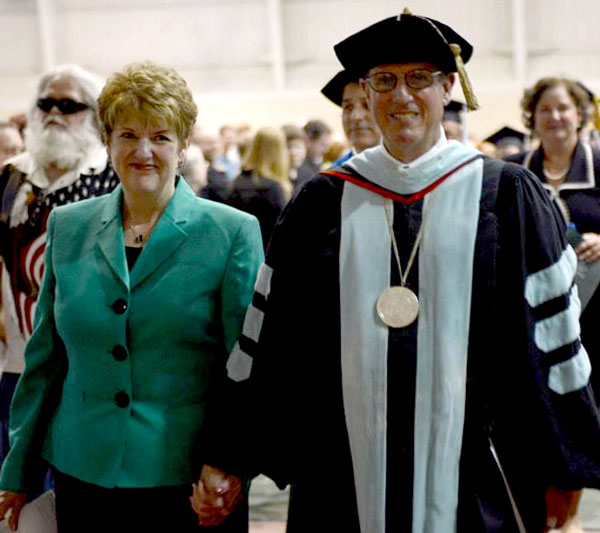
Dr. G. Blair and Chris Dowden walking in their final Huntington University Commencement on May 18, 2013.
 by Steve Dennie (left), Communications Director
by Steve Dennie (left), Communications Director
Dr. G. Blair Dowden is retiring at the end of May 2013 after 22 years as president of Huntington University. It’s been a great run. Under his leadership, enrollment has doubled and the endowment has tripled. A number of buildings have been renovated or built from scratch. Exciting programs have been launched, including Digital Media Arts, Nursing, and several master’s programs. There is a branch campus in Fort Wayne, and an upcoming one in Peoria, Ariz. Huntington’s stature as a quality institution has soared.
Dr. Dowden has led the university far, and has led it well. In the process, our denominational college has remained solidly evangelical. I’ve noticed over the years that people scrutinize Christian colleges for signs of “going liberal.” I have no concerns about that with Huntington. A university, with its emphasis on academic freedom and investigating the full range of ideas and theories (and satisfying accreditation needs), will inevitably encounter tension living in partnership with a church organization that values absolute truth. But Dr. Dowden has served the needs of both the college and the denomination with integrity and the best of intentions, and from a heart devoted to Jesus Christ.
We have been privileged to have Dr. Dowden, and his wife Chris, leading our college for all of these years.
On May 15, I sat down with Dr. Dowden for an exit interview of sorts.
What is in the immediate future for you and Chris?
We were given good advice to take a sabbatical. We’ll spend six months at our lake cottage in Indiana, and do some traveling. We’re going to the Holy Land in October with Denny Miller, and will probably do some other traveling. We’re thinking of taking two weeks on Route 66 and see where it leads. We’ve rented a place in Venice, Fla., for three months, starting in mid-January of 2014.
And then it’s a matter of discerning where God can use our experience and gifts. I’ve received some inquiries about various things, but I respond, “Why don’t you contact me in December, and then we can talk.” So that’s where we’re headed.
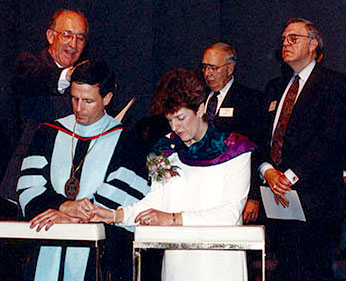
Bishop C. Ray Miller (left) conducting the inauguration of Dr. Dowden in 1991 (kneeling, with wife Chris).
You followed Dr. Eugene Habecker, a very successful president who transformed the college. Did following in those footsteps intimidate you?
It was intimidating to some extent, knowing how successful Eugene was. He was a very good president, and he really changed the course of Huntington, as did the contributions of Orville and Ruth Merillat. I was fortunate to inherit all of that. But it was a little scary to think I’m following a very successful leader.
I knew Gene Habecker before I became president. He actually contacted me and asked me to consider coming. The year before, Gene came to Houghton College, where I had been serving, and did a presentation on the future of higher education. I was part of a faculty panel that responded to his address. Little did I know that he would call me and suggest I apply.
What interactions did you have with your predecessors?
Gene was a fantastic former president, and a great encouragement to me. One of the best practices for a former president is to get away. Gene and Mary Lou were that way. He sent me notes of congratulations, and was always there if I had questions or needed something, but he was never intrusive. He did not hold on to relationships. When he came back to campus, he always called first to let me know he was here. He has been a good friend over the years.
Dewitt and Evelyn Baker were super. When I first came, Dewitt was president emeritus, and he was still involved in contacting alumni. He contacted alumni in Florida during the winter and generated a large group, 70-100, for gatherings there. DeWitt always had a kind word, never a criticism. Since his death in 2000, Evelyn has been so gracious and kind.
I’m sure you came to Huntington with certain priorities and agendas. Were you able to stick to them, or did you get distracted into other urgent needs?
Interesting story. When I came here, the Board of Trustees told me that the critical needs were increasing enrollment and broadening the donor base and college reputation. By year two, I was still working on some internal issues and getting a team in place, and our enrollment was not increasing. Apparently, there was some dissatisfaction on the part of some board members.
Ed Roush, one of the trustees [and a former eight-term Congressman], took it upon himself to call each trustee and say, “I know enrollment hasn’t increased like we thought it would, but I’m 100 percent supportive of Blair. He’s the person we need.” I think it was Ed Roush, and his character and leadership on the board, that made all the difference, and is why I’ve been able to stay 22 years. If he hadn’t intervened, I believe it would have been a very rocky start.
We did focus on enrollment, though it took a couple of years. I hired Jeff Berggren, and he has done a great job leading enrollment. We also expanded our donor base.
You also brought a focus on student life, an area which many people felt had been neglected.
One critical thing I learned after coming, and which I don’t think the trustees were aware of, is that the level of student satisfaction was not high. For ten years there had been a major focus on building up the campus—the facilities and infrastructure—and that was done very well. But it was also very disruptive. Some traditions were lost and campus relationships suffered.
During my first couple of years, I had seniors in my office the week of graduation who expressed their deep dissatisfaction. When Bill Fisher came to interview as campus chaplain, we held an open forum in the Hardy Hall basement. He remarked afterwards, “Wow, students were complaining a lot about a lot of things.”
I realized we needed to focus on student-centeredness, ensuring students that we were listening to them and making this a student-focused environment.
We made some good efforts there. But the significant change came when Dave Rahn, in one of his classes—I think it was an evangelism class—asked students to develop projects to impact the campus.
One student group developed what they called Campus Pride and Revival. They held a meeting in Indianapolis with several faculty, students, and staff. They began by listing the good things happening at Huntington, and then areas that needed to be improved. Then they broke into teams that would actively work on improving those areas. They took ownership to improve the level of student satisfaction. Because of that, I think we went from a low level of student satisfaction to one of the highest levels in the Council for Christian College and Universities, based on student satisfaction inventories that are administered nationally.
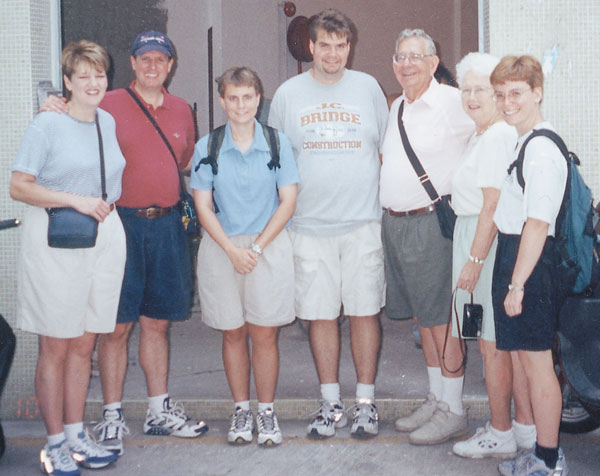
The Dowdens (left) twice spent sabbatical time with UB missionaries in Macau.
You’ve kept a remarkably stable senior leadership team over the years. What accounts for that?
It’s amazing how these folks came to the institution. Sometimes it was because we searched hard and well, but most often they heard about the opening from some other person and came to us in a round-about way. So I think God brought them.
I have always been very committed to developing a strong team. I tried right from the start to develop a team with members who can share anything, that don’t compete against each other, are willing to share resources, and want to work toward the good of the whole. I think that has helped make a stable team of individuals who work together well, enjoy each other, and are committed to the institution and not just their specific area.
We did things together, like hold retreats. We would have several one-day retreats, and then a long three-day retreat where, half of the time, we just did something enjoyable to build relationships—go to a ball game, go bowling, play miniature golf. I firmly believe in the importance of those relationships so that, when you deal with key issues facing the institution, you know each other well.
Let’s talk about diversity. I sense that this is not just something which meets institutional needs, but which is a real passion in you. Where did that come from?
We talked about diversity on campus for years, and tried so many things. Several years ago I decided, and the team decided, that we needed to get serious about this. We couldn’t keep doing what we were doing, because we weren’t very successful in attracting students of diverse ethnic and racial backgrounds. The more I got into it, studied the theology of diversity, what the Bible says from Genesis to Revelation, the more I became convinced that this was the direction God wanted us to go. We wanted to create a campus that was diverse like what we’ll experience in heaven.
Through the programs we’ve established, we’ve come a long way. We have a long way to go, but we’ve made good strides. I’m particularly excited that the board is very supportive of diversity initiatives, and looked for that in selecting a new president. I know that Dr. Emberton is very committed to diversity.
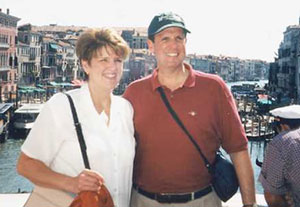
The Dowdens in Venice, Italy, in 2000 during an alumni tour of Europe which began with the Oberammergau Passion Play.
You made diversity a focus of a sabbatical a few years ago.
Chris and I spent a month of the sabbatical touring well-known civil rights sites, primarily in the South. We went to 6 or 7 southern states, visiting places where major events of the civil rights movement occurred, and we supplemented that with some reading. It was very sobering, but definitely reinforced my commitment to diversity on our campus and that God wanted us to move in that direction.
Huntington is not a very diverse town, but neither is our denomination. The whole state of Indiana, for that matter, is not very diverse compared to a state like New York, in which a third of the population is non-Caucasian.
We’ve had a great relationship with Youth for Christ USA and Fort Wayne Youth for Christ in helping us establish the Horizon program and attract diverse students.
I’m sure the world of Christian higher education has changed greatly during the past 22 years. What are some changes you’ve seen?
I would say those changes have accelerated greatly since 2007. The economic situation has impacted endowments and giving, affected the ability of families to pay for private higher education, and has impacted the ability of state and federal governments to provide financial aid.
I think the willingness of parents to pay for a private education is less than it was ten years ago. The loan situation, and the fact that it’s being highlighted in the press—sometimes falsely—and the burden of debt that some students carry, is a great concern as well. So things have changed dramatically since 2007, and not only in Christ-centered education.
Every institution I know has been impacted—from elite schools like Harvard and Yale, whose endowments have been down up to 50%, to state schools like Indiana University and Purdue, to schools like Huntington University. Unfortunately, schools have had to take strong action: layoffs in many institutions, programs dropped because they weren’t attracting students, increased efforts to fundraise, more institutional dollars going to financial aid because of the drop in state and federal dollars. It has changed the whole complexion of higher education.
Is Huntington impacted by the for-profit online schools like University of Phoenix?
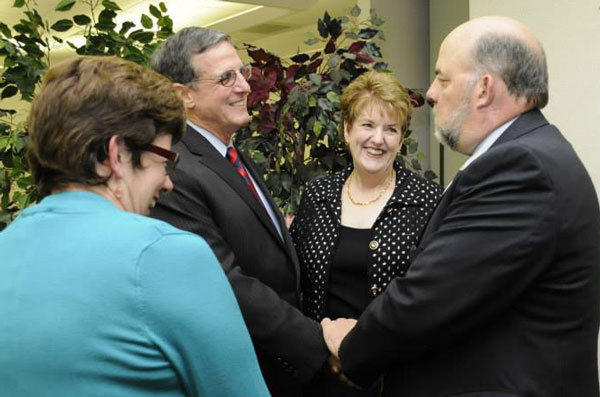
The Dowdens talking to Brooks Fetters, mayor of Huntington, during a May 21 reception.
We are. The whole nature of what a course is, and what a credit is, is being reevaluated. For the first time, the US Department of Education has allowed a couple of experiments where they are decoupling seat time, sitting in a class, from credits. That’s being done through competency-based education. Conceivably, a student might not need to read any books, or might only read some books, take a test, and if he or she meets the competency requirements of that class, would get credit for it. That would be a significant change in higher education.
Colleges now have these massive open online courses (MOOCs). The MOOCs started in California with a Stanford faculty member and have spread to a lot of elite institutions and elite faculty members. Some classes may have 200,000 students in them. The question being considered is whether or not institutions will grant credit for these classes, and how do you judge competency. That’s still to be determined and is being reviewed by a variety of boards and entities in higher education.
So the changes in what constitutes a degree and what constitutes a credit hour are dramatic. I get articles probably twice a week on MOOCs. But interestingly enough, some faculty bodies around the country are standing up against MOOCs. It’s a volatile, changing environment and will continue over the next several years.
And it’s changing daily. I receive daily updates of articles from around the country. You just don’t know what’s going to happen next. It’s incredibly challenging, but a wonderful environment for opportunities as well if you are able to take advantage of them.
We’ve added a lot of programs. I think the most significant occurred eight years ago when we received some unrestricted money from Lilly. I set aside $1.5 million for starting new programs suggested by faculty. Faculty put together some proposals, then a faculty group reviewed them and made recommendations. Out of that came Digital Media Arts, our largest major, and Nursing, which I believe is our second or third largest major. Worship Leadership and Social Work also came out of that review. That was a major time of adding programs that have impacted the institution and increased enrollment.
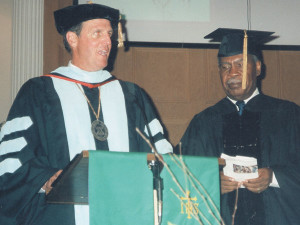
In 2001, Dr. Dowden bestowed an honorary doctorate on Lloyd Spencer (right), longtime pastor/superintendent in Jamaica Conference.
More and more, students—not so much our students, but it does include some of them—are putting together their education from a variety of sources. They’ll take an online class here, a summer class at another institution, a competency-based class somewhere else. Then eventually they put it all together and graduate from someplace. They are essentially doing a self-developed degree.
It’s not like it used to be, when students would come as freshmen and stay at one institution until graduating. That’s much more the case at Huntington, but we do have students taking online classes at other institutions, both during the semester and during the summer, and transferring them in, or going to community college for the first year or two and then transferring. That’s more typical than a few years ago.
What will be some enduring memories of Huntington for you and Chris, when you look back in 10 or 20 years?
We’ll never forget our times with students, especially the midnight study break at our house every fall. We originally held it from 8:00 to 9:30, and we’d have 25-30 people in our home for refreshments. Thinking we might attract more students, we moved it to 9:00 to 11:00, and we had 75-100 students. So we thought, Let’s go all out. We started at 11 pm and finished at 1 am. After that, 300-400 students would come. The first year we changed, we had so many students we didn’t have enough food for everyone.
One year Chris and I dressed as an older couple, another time in 60’s clothes. One year we wore Huntington University bathrobes. Another year, I was Neo from the Matrix. Faculty members showed up wearing crazy clothes to serve refreshments. Students tell us it was a very special part of their Huntington experience.
We’ll also remember times with our trustees, who have become very special and close. I’ll never forget my first board retreat in Orlando. Former bishop Clyde Meadows was part of the board then, or was an advisory trustee. Here’s a man over 90 years old who did some fun things that showed his youthful spirit and heart.
We have developed so many close friendships with our donors and trustees. We’ll miss them. They’ve become some of our closest friends. It will be like a long-term pastor leaving a church.
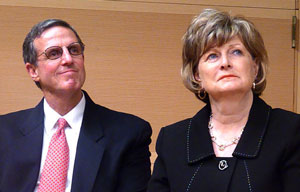
Dr. Dowden and Dr. Sherilyn Emberton
You are clearly enthusiastic about Dr. Sherilyn Emberton’s selection as the new president.
Dr. Emberton has an incredible background. Not only has she been a classroom teacher, but she has been in business and has been a senior administrator at a university. She has outstanding credentials. One thing she has done in her career is develop programs. I think she will continue developing new programs here. She has also administered and led multi-campus institutions. We are developing a greater presence in Fort Wayne, and with our upcoming campus in Peoria, Ariz., she’s the right person to mature those two initiatives and make sure they get off to a good start.
I was encouraged when I read her credentials. When she was here for the announcement, Chris and I spent time with her, and I would say our excitement about Dr. Emberton is greater than before, and it was high already. We appreciated the good questions she asked, the spirit in which she asked them, and her very evident leadership abilities.
Anything else you’d like to say to the United Brethren people?
I’ve really appreciated getting to know people throughout the church. I’m glad that for at least half of my presidency, the denomination had the annual conferences, which were an opportunity to get to know a lot of people. We sat down for meals together, I always gave an update and they had great questions, and I stayed for a lot of the conference to hear what was happening in ministry. I greatly enjoyed that. Since then we’ve had the US National Conference to connect with people and learn what is happening in their lives.
I think the university has helped strengthen the denomination, and has provided support in significant ways. And likewise, I think the denomination has helped to strengthen Huntington University and has provided support not only through finances, but through prayer and encouragement.
It’s exciting for me to see how many individuals in the denomination have a connection with Huntington University, either being a graduate, having a child attend here, or just giving their prayer and financial support. At the last US National Conference I asked that question—how many people had attended Huntington or had a son or daughter attend. I’ll bet two-thirds raised their hands. It was gratifying to see the many connections with the church.
I’ve enjoyed working with the bishops throughout the years and other leaders. It’s been a good relationship.

No Comments